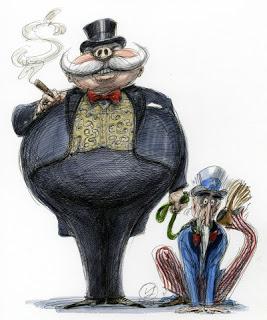 (Cartoon image is by Victor Juhasz at billmoyers.com.)
(Cartoon image is by Victor Juhasz at billmoyers.com.)Donald Trump (and congressional Republicans) told a lot of lies when passing their tax reform (tax cuts for the rich). They said it was a tax cut for the middle class. But the rich got over 80% of the cuts. They said it would raise worker wages by an average of $4000. But corporations just bought back their stock instead of raising wages. They said it would create massive job growth. Again, corporations opted to buy back stocks instead of creating jobs.
Trump also promised that corporations would repatriate $5 trillion dollars that they had been keeping overseas to avoid taxes. Guess what? That was just another lie.
Here's how Matt O'Brien explains it in an article for The Washington Post:
In this case, President Trump has said that his recently passed plan to allow companies to move any future foreign profits back to the United States without being subject to U.S. taxes, and move back any past profits while facing only a nominal tax, will unleash a flood of money into the country. “We expect to have in excess of $4 trillion brought back very shortly,” he told a group of business leaders in August, and in all likelihood something “close to $5 trillion.” The only problem is that Trump’s claim shouldn’t be true, and so far, it hasn’t been. The Wall Street Journal estimates that the nation’s biggest publicly traded companies have repatriated $143 billion this year, while the Federal Reserve puts the number at a slightly more than $300 billion. Whichever number is accurate, it’s 94 percent to 97 percent less than Trump predicted. There’s a simple reason the Trump tax cuts haven’t inspired companies to move that much money to the United States: The money was already here. How is that possible when American companies were allegedly stashing $2.6 trillion overseas to avoid taxes? The important thing to understand is that foreign profits were taxed when companies brought them back to the United States to put into their businesses but not when they brought them back to put into other things — which, of course, is exactly what cash-rich companies such as Apple did. Of the roughly $250 billion that the tech giant was supposedly holding overseas last year, about $208 billion was in U.S. Treasury bonds, corporate bonds, or Federal National Mortgage Association and Federal Home Loan Mortgage Corp. debt. And that’s pretty low, compared with Apple’s peers. The Brookings Institution estimates that the 15 American companies with the most cash on hand already held 95 percent of it within the United States even before the Trump tax cuts took effect. The tax cuts aren’t likely to prompt companies to invest more in their own businesses, either. Again, this has already been happening — companies were using borrowed money rather than their overseas earnings to invest. This saved on taxes in two ways: Companies could deduct the interest they were paying on their borrowing, and if they could persuade Washington to give them another tax repatriation holiday, like the one in 2004, they would not owe Uncle Sam much on their foreign profits, either. This was more than worth the minimal amount they had to pay to borrow money in the first place. And so, they’ve been making the investments in their businesses without needing a tax break on their overseas earnings to do so. Which is to say that as beneficial as the tax cuts may be for investors, they’re not significant for the U.S. economy. Under the new tax law, companies will just take the money they had been putting into U.S. Treasury and corporate bonds and use it to either pay down their debt, buy back their shares or pay out bigger dividends. But, in any case, the growth in American jobs and investment that is “supposed to follow” will “not occur.”. . . It turns out, then, that Trump left out a word when he said that he wants to put “America first.” What he really meant is that he wants to put corporate America first. What else would you call giving companies a tax cut that, if history is any guide, won’t help the U.S. economy at all other than to make wealthy investors even better off — and at a time when profits were already at all-time highs as a share of the economy?

